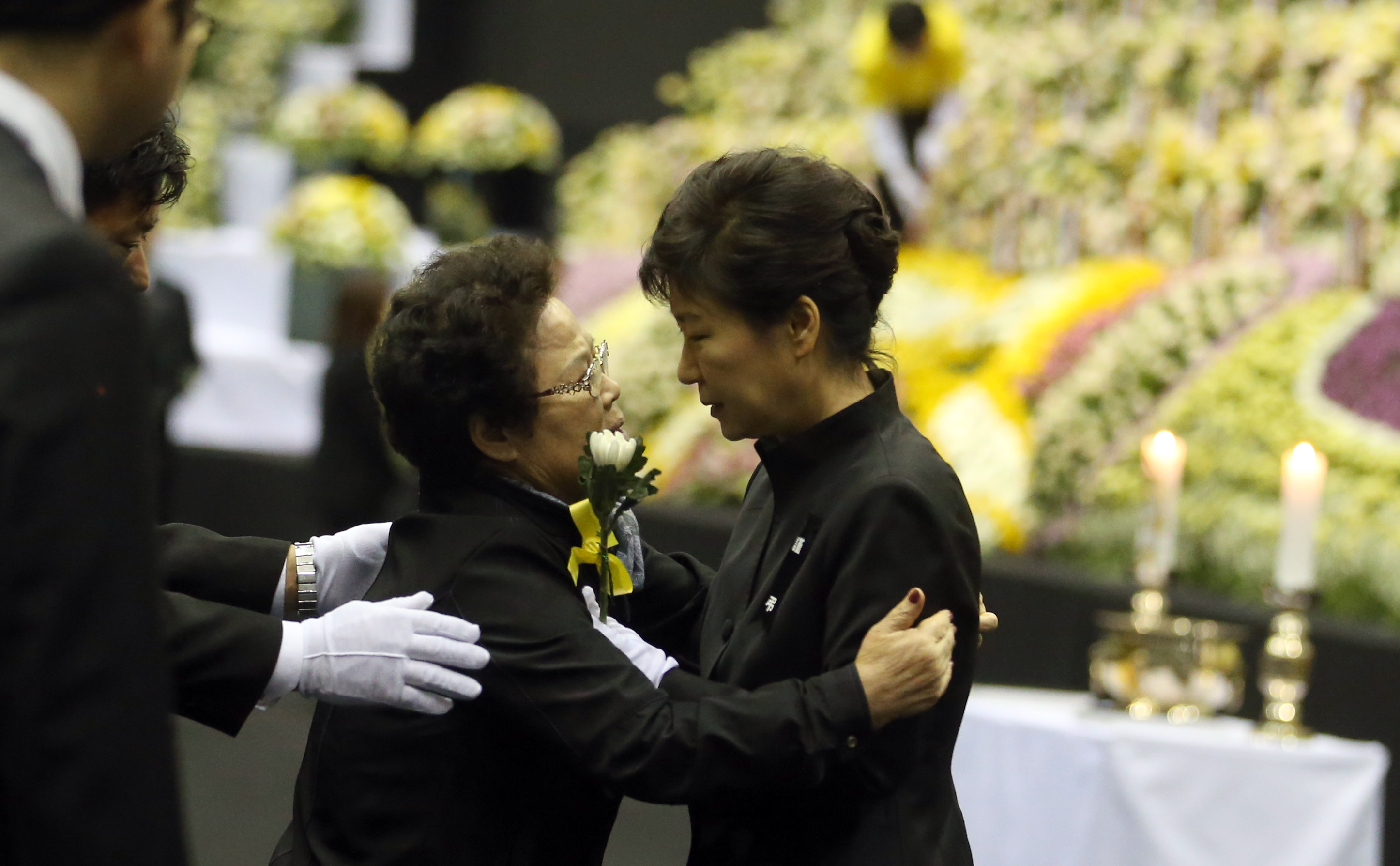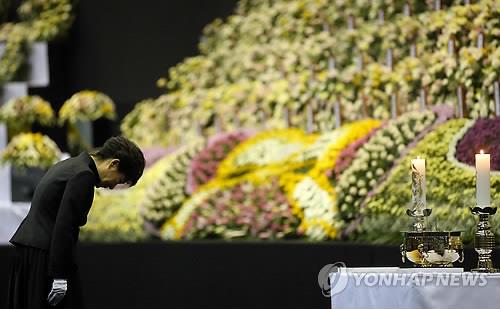- California Assembly OKs highest minimum wage in nation
- S. Korea unveils first graphic cigarette warnings
- US joins with South Korea, Japan in bid to deter North Korea
- LPGA golfer Chun In-gee finally back in action
- S. Korea won’t be top seed in final World Cup qualification round
- US men’s soccer misses 2nd straight Olympics
- US back on track in qualifying with 4-0 win over Guatemala
- High-intensity workout injuries spawn cottage industry
- CDC expands range of Zika mosquitoes into parts of Northeast
- Who knew? ‘The Walking Dead’ is helping families connect
President Park apologizes over ferry disaster

South Korean President Park Geun-hye, right, comforts a mourner as she pays tribute to the victims of the sunken ferry Sewol at a group memorial altar in Ansan, south of Seoul, South Korea, Tuesday, April 29, 2014. (Yonhap)

President Park Geun-hye bows her head before a mourning altar for victims in the sinking of the ferry Sewol on April 29, 2014. (Yonhap)
SEOUL, April 29 (Yonhap) — President Park Geun-hye apologized Tuesday over the deadly sinking of the ferry Sewol, saying the government failed to prevent the disaster and bungled its initial response to and handling of one of the deadliest accidents in the country.
“I don’t know how to apologize for the failure to prevent the accident and for the insufficient way it was handled, including the initial response, in order to comfort the pains and sufferings (of relatives of the victims) even for a moment,” Park said during a Cabinet meeting.
“I am sorry to the people and heavy hearted that many precious lives were lost,” she said.
It was the first time Park has apologized over the April 16 sinking.
A total of 302 people, most of them high school students, are dead or missing from the sinking, though the confirmed death toll stood at 193 as of Tuesday morning and many of the 109 people still listed as missing are also presumed dead inside the sunken ship.
Public anger has mounted that the government was slow and incompetent in responding to and handling what is expected to be one of South Korea’s deadliest maritime accidents ever. The disaster also revealed serious lapses in the government oversight of safety practices.
Prime Minister Chung Hong-won has offered to resign, holding himself responsible for the poor handling of the sinking. Park said she will accept the resignation after the situation is brought under control. But she had since been under pressure to issue an apology herself.
Park sees the disaster as a combination of long-running irregularities and corruption deeply rooted in many corners of South Korean society, such as belittling and overlooking safety regulations for the sake of efficiency and collusive ties between regulators and businesses.
During Tuesday’s Cabinet meeting, Park expressed deep frustrations.
“I regret so much that this incident has happened as we failed to set right evils long accumulated from the past,” she said. “We should have made greater efforts to set right wrong and abnormal practices in the early period of the administration.” She pledged to do her best to remedy all such problems and push for strong reforms of the officialdom.
Mindful of criticism that there is no “control tower” overseeing rescue efforts in such disasters, Park ordered the creation of a government agency in charge of dealing with such large-scale accidents. The so-called national safety ministry will be placed under the prime minister’s office, she said.
She also ordered a complete overhaul of South Korea’s safety system.
“We should have a firm determination to build the entire safety system of the Republic of Korea from scratch,” Park said. “The entire Cabinet should come up with safety measures for the people with an attitude to remodel the country from square one.” Rep. Kim Han-gil, a co-leader of the main opposition New Politics Alliance for Democracy, said he hopes Park’s apology would be a solace to the people. Kim also said not only the president but also everyone else handling state affairs, including opposition lawmakers, are “sinners.” Rep. Ahn Cheol-soo, the other co-leader of the party, said the ferry disaster has left people questioning what a nation, politics and leaders are for and that lawmakers should work harder to make the country safer.
Earlier in the day, Park visited a mourning altar and paid her respects to victims.
Dressed in black, Park offered incense and bowed her head before rows of black-draped portraits of victims lined up on a giant altar laden with chrysanthemums at the official mourning center in Ansan, south of Seoul.
Ansan is home to Danwon High School, which lost about 260 students and teachers in the disaster.
Before paying her respects, she walked slowly from one side of the hall to the other while gazing at the altar and holding a white chrysanthemum with a yellow ribbon tied to it. At one point, she was stopped by a crying, elderly woman and embraced her.
She also wrote a condolence message.
Park later met with relatives of victims and promised to make the country safer.
“I am going to be holding a Cabinet meeting after this. I will make sure these sacrifices won’t go down the drain by cutting out all accumulated evils (in the society) and build a safe country,” she said.
Park heard a number of family members venting out their anger and frustrations. At the end of the visit, a man knelt before her and said, “Please make sure this kind of incident won’t happen again.” Park promised she will do so.















